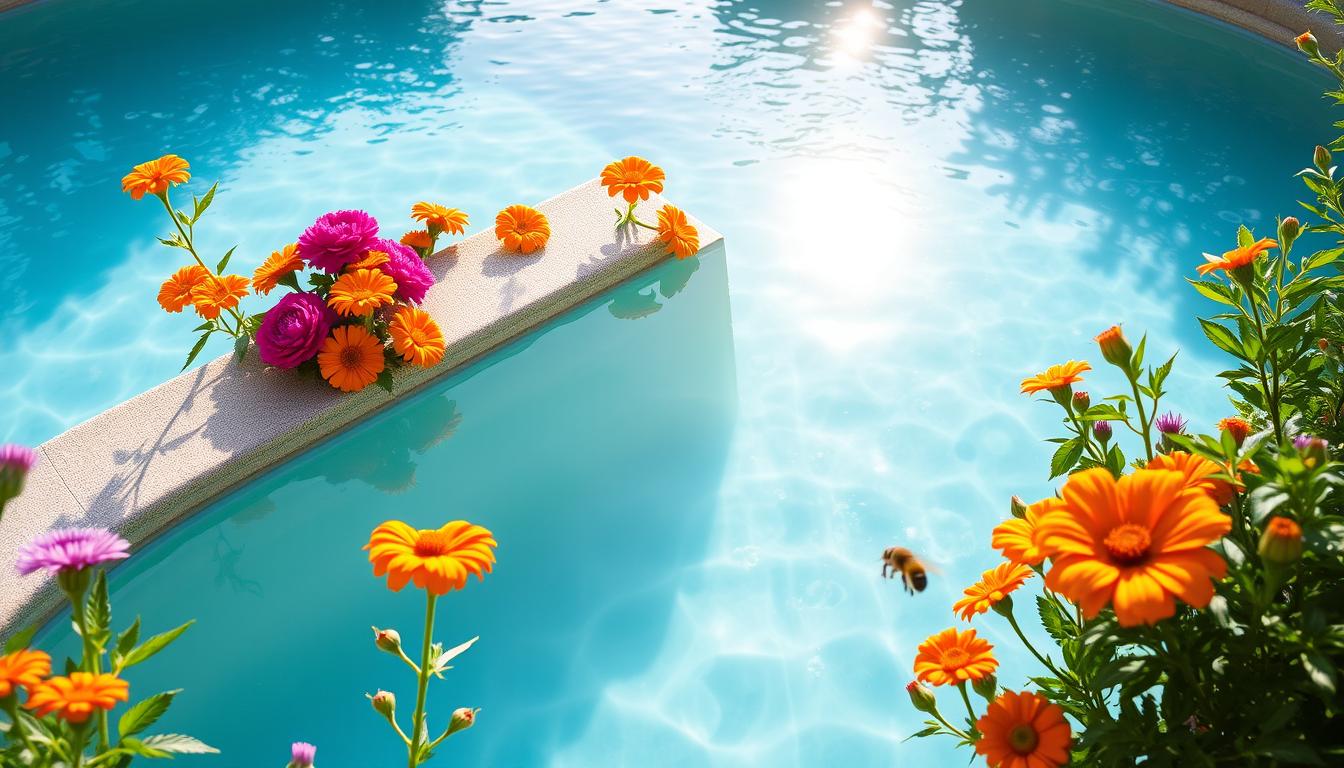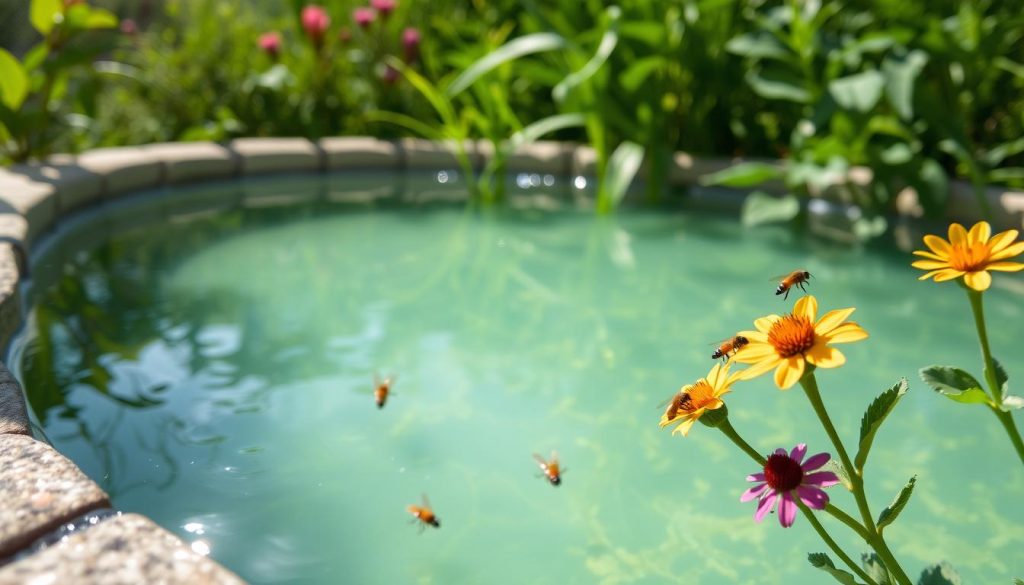
Bees are drawn to salt water pools by the strong chlorine or salt water scent. They often visit these pools for water, especially during nectar shortages. Pool owners need effective bee deterrents to ensure safe, enjoyable swimming experiences.
Let’s explore natural bee repellents and tactics to keep bees away from your salt water pool. These methods will help create a more pleasant outdoor space for you and your guests.
Understanding Why Bees are Attracted to Salt Water Pools
Bees often visit salt water pools, especially during weak nectar flow periods. They seek hydration and essential minerals found in salt water. Understanding these factors helps protect our pools from bees effectively.

Salt water pools attract bees in early spring and late summer. This happens when nectar is scarce. Bees need water and minerals to survive during these times.
Bees Seek Water Sources During Nectar Shortages
When nectar is scarce, bees look for other water sources. A homeowner noticed honey bees at his new salt water pool. They came from beehives half a mile away.
Bees flew in a specific direction from the pool to the beehives. This shows a pattern of behavior. It’s important to know about bee populations in your area.
Salt Water Pools Provide Essential Minerals for Bees
Salt water pools offer bees important minerals for their health. These minerals help bees with bodily functions and larva development. They also boost immune systems and aid royal jelly production.
- Maintaining proper bodily functions
- Supporting the development of healthy larvae
- Enhancing their immune system
- Aiding in the production of royal jelly
The table below shows key minerals in salt water pools and their importance for bees:
| Mineral | Importance for Bees |
|---|---|
| Sodium | Maintains proper fluid balance and nerve function |
| Chloride | Aids in digestion and nutrient absorption |
| Potassium | Supports muscle function and energy metabolism |
| Magnesium | Essential for enzyme activation and cell signaling |
Knowing why bees like salt water pools helps us create bee-safe pool areas. We can offer other water sources or use natural deterrents. Working with local beekeepers also helps both bees and pool users.
Creating Alternative Water Sources for Bees
Bees need safe water sources away from our pools. We can set up bee-friendly watering stations to help. These stations support bees and keep our pools clean.
Let’s look at some ways to give bees the water they need. These solutions are easy to implement and bee-friendly.
Setting Up Bee-Friendly Water Stations
Bee-friendly water stations are simple to create. Use shallow dishes or bird baths with fresh water. Add landing spots for bees to drink safely.
Here are some ideas for water stations:
- Repurposing old dishes, pots, or containers and filling them with water
- Using bird baths with built-in solar fountains to keep the water moving and fresh
- Placing rocks, sticks, or glass marbles in the water to provide perches for bees
- Locating the water stations away from the pool area, preferably near bee-attractive plants
Using Dripping Hoses or Soaker Hoses
Dripping hoses or soaker hoses provide a constant water source. Set them on low flow to create a gentle stream for bees.
Benefits of this method include:
- Providing a steady water supply without the need for frequent refilling
- Creating a shallow, safe drinking area for bees along the length of the hose
- Allowing for easy placement in bee-friendly garden areas or near flowering plants
- Conserving water compared to traditional sprinklers or irrigation systems
Providing Shallow Dishes with Pebbles or Sticks
Shallow dishes with pebbles or sticks make great bee watering stations. These landing spots help bees drink safely without drowning.
Try these tips for setting up dishes:
- Use wide, shallow dishes to maximize surface area and minimize water depth
- Fill the dishes with clean, fresh water and replace it regularly to prevent stagnation
- Add pebbles, marbles, or sticks to create a variety of perches for bees
- Place the dishes in shaded areas to prevent rapid evaporation and overheating
| Water Source | Key Features | Benefits for Bees |
|---|---|---|
| Bee-Friendly Water Stations | Shallow dishes, bird baths, solar fountains, landing spots | Safe drinking access, variety of perches, fresh water |
| Dripping Hoses or Soaker Hoses | Low flow, constant water supply, shallow drinking areas | Steady water source, accessible along hose length, water conservation |
| Shallow Dishes with Pebbles or Sticks | Wide, shallow design, landing surfaces, shaded locations | Minimized drowning risk, varied perches, reduced evaporation |
These bee-friendly water sources help manage bees near pools. They give bees the water they need to thrive. This creates a balance between humans and bees in outdoor spaces.
How to Keep Bees Away from Salt Water Pool
Keeping bees away from your salt water pool is possible with effective methods. You can create a bee-friendly environment while enjoying your pool undisturbed. Let’s explore some strategies to deter bees from your pool area.
Planting Bee-Attractive Flowers and Herbs Away from the Pool
Plant bee-attractive flowers, herbs, and shrubs far from the pool. Mint, lavender, eucalyptus, and lemongrass are plants that repel bees. These plants beautify your garden and lure bees away from the pool area.
By providing a more appealing alternative, you reduce the chances of bees visiting your pool. This method creates a win-win situation for both you and the bees.
Avoiding Bright Colors and Strong Scents Near the Pool
Bees are drawn to bright colors, especially blue, violet, and purple. Avoid using vibrant colors on pool furniture, toys, or accessories. Keep food covered and limit sweet beverages around the pool.
Strong scents from geraniums, marigolds, and citronella can deter bees. Consider adding these plants to your landscaping near the pool. They’ll help create a less attractive environment for bees.
Adding Water Features or Jets to Deter Bees
Bees dislike rapidly moving water and can easily drown in it. Add water features, fountains, or jets to your salt water pool. The fast-moving water will deter bees from approaching the pool.
This method reduces the chances of bees getting trapped or drowned. It also adds an attractive and soothing element to your pool area.
| Plants that Repel Bees | Bee-Deterrent Scents | Pool Features that Deter Bees |
|---|---|---|
| Mint | Geraniums | Water fountains |
| Lavender | Marigolds | Waterfalls |
| Eucalyptus | Citronella | Water jets |
| Lemongrass | Peppermint | Rapidly moving water features |
Conclusion
Living with bees near a salt water pool requires smart planning. We can use effective bee deterrents and safe management practices. Understanding why bees like salt water pools helps us find good solutions.
Creating bee-friendly water stations away from the pool is helpful. These can include shallow dishes and dripping hoses. This gives bees the water they need without bothering swimmers.
Planting bee-attractive flowers far from the pool can help. Avoid bright colors and strong scents near the swimming area. Adding water features or jets can also keep bees away.
Honey bee populations have stayed stable recently. However, they still face challenges. Our efforts to live with them can help their well-being.
By using these strategies, we can enjoy our pools and support bees. Finding a balance between our needs and theirs is key. With understanding and effort, we can coexist with these important pollinators.







